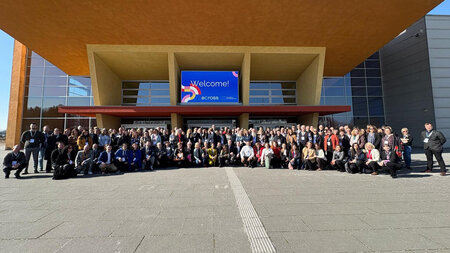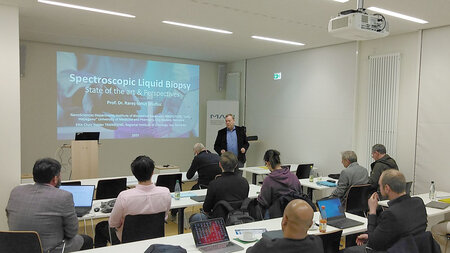Golden Rules for Everyday Sustainability
The Professorship of Corporate Environmental Management and Sustainability at Chemnitz University offers practical tips to promote sustainability in all aspects of everyday life
-

The Permaculture Garden on Chemnitz University’s campus is an excellent example of sustainability practices in an everyday context. The project, which debuted in 2012, is overseen by NATUC – a department of the Student Council focused on ecology and sustainability. (www.permakultur-tuc.de) Photo: Press office image archive/Christian Schenk
On the occasion of the United Nations Conference on Sustainable Development in 2012, the German Federal Government also established national Sustainability Action Days. The goal of this initiative is to highlight exemplary dedication to the ideals of sustainable living, raise awareness for the cause and to inspire more people to engage in actions that promote sustainability. To this end, the Professorship of Corporate Environmental Management and Sustainability at Chemnitz University has put together a list of recommendations for all of us to practice more sustainability in our everyday lives. The list is arranged according to ten areas of need. “You can first decide if you need something, then how you would like to obtain it and then you can choose products and services that are sustainability-oriented,” Prof. Dr. Marlen Arnold, Chair of the Professorship, suggests to readers.
1. Food and Beverages
- When purchasing groceries, look for certified organic, fair trade and sustainability labels as well as regional manufacturing and seasonal products.
- Cultivate your own fruit and vegetables in a small garden and/or grow herbs in your kitchen. You can even make juice or jam from fruit that you harvest.
- If you buy too much food at one time or if you have a particularly good harvest from your garden, freeze the excess to consume at a later date or give it away to others who could use it.
- Avoid throwing away food.
- Choose products that have short manufacturing and transportation chains.
- Avoid disposable items and packaging. Use your own storage containers and buy in bulk or purchase unpackaged items. Take advantage of re-usable/returnable systems (such as bottle deposits) and choose glass over plastic.
- Use tap water.
2. Living
- Use cleaning products containing non-eco-toxic chemicals. It is possible to clean many surfaces using ordinary household products like baking powder or vinegar.
- Be mindful of your energy, heat and water consumption. Avoid using stand-by functions, turn off lights and technological devices when they are not needed. Replace old light bulbs with more energy-efficient lights (e.g. LEDs) and install motion sensors in certain rooms or outside spaces.
- Purchase energy-efficient appliances and durable and modular furniture.
- In house construction, restoration or renovation, sustainability is key. The most important aspects include minimizing energy use and resource consumption.
- When choosing paint, paving materials and flooring materials, choose products with quality seals and eco-labels. By making this choice, you can minimize pollutants.
- Before you decide to dispose of worn-out furniture, consider if it is possible to make something new and unique out of it instead.
3. Mobility
- For short trips, leave your car at home. Take your bike or walk – you can get some healthy exercise and you can do the environment a big favor at the same time.
- Take public transportation or the train when possible.
- When you do need to use your car, carpool and/or drive in an energy-efficient manner. Turn off your motor when stopped for a longer period of time.
- For people who infrequently need to drive, car sharing or electric vehicles might be a current alternative.
- Avoid traveling by plane.
4. Vacationing and Tourism
- Consider nature conservation, environmental protection and sustainability even when you are on vacation.
- When you are planning a trip, weigh your options carefully. Do you need to take a trip with an airplane – or does your own region or country offer closer attractions and various recreational opportunities? Avoid air travel whenever possible and compensate for plane trips by, for example, planting trees or investing in climate protection projects.
- Stay in eco-hotels or other forms of sustainable accommodations.
- Are you traveling abroad to remote destinations? Support regional supply chains, local farmers and rely on local products.
- Look for local and sustainability-oriented restaurants.
5. Fashion and Beauty
- Buy clothing made from eco-friendly or recycled materials whenever possible. Also prefer used items or products that are manufactured locally.
- Be mindful of the materials used and look for eco-friendly and sustainability seal labels. Pure fabrics (cotton, wool, polyester, etc.) are preferable to blended fabrics (e.g. cotton and polyester blend).
- Before you throw away an item of clothing, consider other options. You could exchange it or give it to someone else, bring it to a second hand shop or create something new out of it.
- It is possible to lease baby clothes.
- When buying cosmetics, always pay attention to the ingredients.
- Avoid synthetic fragrances and dyes as well as silicone.
- Avoid microbeads and microplastics. Be mindful of and reduce your consumption of the following kinds of plastic: polyethylene (PE), polypropylene (PP), polyethylene terephthalate (PET), polymethylmethacrylate (PMMA), polytetrafluorethylene (PTFA) and nylon.
6. (General) Consumption
- Buy regional, seasonal, organic, fair trade and sustainable products.
- Visit flea markets or second hand shops. Many items are still too good to simply be thrown away. This saves money as well as resources.
- Use items multiple times or share them. For example, make use of swap meets, rental items and classified ads.
- Make the change to green energy.
- Correctly sorting household waste protects the environment. In Germany, organic and residual waste should be separated from glass, plastics and paper waste. Batteries and medications should never be disposed of in household waste! Collect scrap paper and bring this to a proper collection site. (More information about waste separation is available here: http://www.study-in-chemnitz.com/en/Living/Waste_separation__2299.html)
- Report illegal waste disposal.
- Avoid packaging and waste. Use re-usable packaging materials. Bring food and drinks along with you using your own bottles and containers. When you go shopping, use long-lasting fabric bags instead of plastic ones.
- Avoid using plastic and dispose of it properly.
7. Information and Communication
- Find out more about sustainability and spread the word. Offer tips and encouragement to others. If you have questions, contact manufacturers directly.
- Instead of stand-by functions, turn off your devices. Turn off your phone more often.
- Remove charging cables as soon as your devices are fully charged.
- Use appliances and devices with very good energy efficiency ratings.
- Lifespan, durability and useful life are important: buy long-lasting products and use them for as long as possible.
- Share appliances and informational materials with neighbors or friends.
8. Recreation and Free Time
- Germany’s Sustainability Action Days and European Sustainable Development Week take place every year. Get involved!
- Visit Green Events! Large-scale events can have negative environmental impacts due to the traffic and waste they create. It is vitally important to sustainably protect our natural resources. Don’t litter and be sure to dispose of your trash correctly. Arrange carpools or use public transportation.
- Even athletic activities can have an impact on the environment. When you purchase athletic apparel, pay attention to the fabrics used and check whether the item was produced in an eco-friendly manner.
- Buy toys made from renewable resources (e.g. wood, bamboo) and without harmful substances in the dyes and paints used. Make your own toys – there are lots of tutorials available with creative ideas and children can even get involved in the process.
- Take a break from the digital world more often. Give your phone, computer, e-reader, etc. a rest and choose a book instead. Spend quality time with family and friends.
- Bring your food and drink along with you in your own containers.
- When you are out and about, pick up litter and dispose of it correctly.
9. Education and Lifelong Learning
- There are many various education opportunities focused on the topic of sustainability. This includes degree programs or programs for continuing education, certificate programs, lectures or dedicated organizations or groups, e.g. Agenda 21, Carlowitz-Gesellschaft e. V., NATUC etc.
- Sustainability-oriented career fields include water management, forestry management or urban planning.
10. Work and Employment
- Get involved in networks focused on making the business world (more) sustainable.
- Design your entire supply chain to be green and sustainable. Buy equipment with eco- and social quality seals, such as Blauer Engel, Cradle to Cradle Certified™ Product Standard etc.
- Use and implement sustainable codes of ethics, certificates and management systems in your workplace environment, e.g. the German Sustainability Code, EMAS, ILO, ISO 26000, ISO 14001, OECD Guidelines for Multinational Enterprises, OHSAS 18001, United Nations Conventions against Corruption, UN Global Compact, United Nations Universal Declaration of Human Rights etc.
- Encourage your employees and coworkers to engage in sustainable practices and acknowledge their efforts. Be an advocate for sustainability – as a manager or as an employee.
The Professorship of Corporate Environmental Management and Sustainability is happy to explain the reasoning behind each of the action recommendations mentioned here. Please contact: Prof. Dr. Marlen Arnold, Tel.: +49 371 531-34252 (Secretary), E-mail: marlen.arnold@wirtschaft.tu-chemnitz.de, or Anne Fischer, Tel.: +49 371 531-34773, E-mail: anne.fischer@wirtschaft.tu-chemnitz.de
Mario Steinebach
30.05.2018





